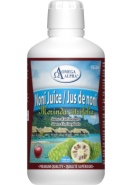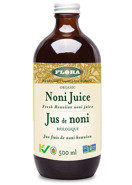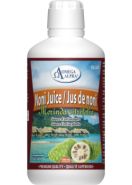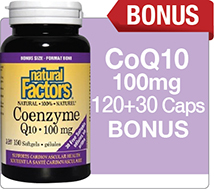Noni
-
 Providing you with an abundant source of antioxidants, Omega Alpha Noni Apple Flavoured Juice is derived from Morinda citrifolia (Noni Fruit) and delivers 3400mg per tablespoon. Noni works to stimulate the immune system and repair damaged cells. Because of this, Noni is traditionally given for asthma, digestive complaints, fevers, infe...Providing you with an abundant source of antioxidants, Omega Alpha Noni Apple Flavoured Juice is derived from Morinda citrifolia (Noni Fruit) and delivers 3400mg per tablespoon. Noni works to stimulate the immune system and repair damaged cells. Because of this, Noni is traditionally given for asthma, digestive complaints, fevers, infections, diabetes and high blood pressure. Noni fruit is a good source of fiber and is believed to contain more than 150 nutrients, including vitamins (A, B1, B2, B3, C and E), minerals (calcium, iron, magnesium, potassium and selenium), protein, amino acids (including all the essential amino acids), phytonutrients, polysaccharides and digestive enzymes. It is due to the large number of nutrients in noni that it is considered a superfruit. Adults are recommend to supplement with 2 tablespoons once per day on an empty stomach and can be mixed with juice or water. [LIQUID]+ Earn 32 Reward Points
Providing you with an abundant source of antioxidants, Omega Alpha Noni Apple Flavoured Juice is derived from Morinda citrifolia (Noni Fruit) and delivers 3400mg per tablespoon. Noni works to stimulate the immune system and repair damaged cells. Because of this, Noni is traditionally given for asthma, digestive complaints, fevers, infe...Providing you with an abundant source of antioxidants, Omega Alpha Noni Apple Flavoured Juice is derived from Morinda citrifolia (Noni Fruit) and delivers 3400mg per tablespoon. Noni works to stimulate the immune system and repair damaged cells. Because of this, Noni is traditionally given for asthma, digestive complaints, fevers, infections, diabetes and high blood pressure. Noni fruit is a good source of fiber and is believed to contain more than 150 nutrients, including vitamins (A, B1, B2, B3, C and E), minerals (calcium, iron, magnesium, potassium and selenium), protein, amino acids (including all the essential amino acids), phytonutrients, polysaccharides and digestive enzymes. It is due to the large number of nutrients in noni that it is considered a superfruit. Adults are recommend to supplement with 2 tablespoons once per day on an empty stomach and can be mixed with juice or water. [LIQUID]+ Earn 32 Reward PointsSale: $32.99
Reg.: $36.29 (Save $3.30)
In Stock -
 Flora's pure, organic Noni juice supports overall good health by supporting the immune and digestive systems. Noni is known around the world as a super fruit because it is high in antioxidants and packed with other nutrients. Flora's noni juice is fresh from Hawaii and each serving contains 16% the daily value of vitamin C. [LIQUID]Flora's pure, organic Noni juice supports overall good health by supporting the immune and digestive systems. Noni is known around the world as a super fruit because it is high in antioxidants and packed with other nutrients. Flora's noni juice is fresh from Hawaii and each serving contains 16% the daily value of vitamin C. [LIQUID]+ Earn 28 Reward Points
Flora's pure, organic Noni juice supports overall good health by supporting the immune and digestive systems. Noni is known around the world as a super fruit because it is high in antioxidants and packed with other nutrients. Flora's noni juice is fresh from Hawaii and each serving contains 16% the daily value of vitamin C. [LIQUID]Flora's pure, organic Noni juice supports overall good health by supporting the immune and digestive systems. Noni is known around the world as a super fruit because it is high in antioxidants and packed with other nutrients. Flora's noni juice is fresh from Hawaii and each serving contains 16% the daily value of vitamin C. [LIQUID]+ Earn 28 Reward PointsSale: $28.99
Reg.: $35.99 (Save $7.00)
In Stock -
 Noni works to stimulate the immune system and repair damaged cells. Providing you with an abundant source of antioxidants, Omega Alpha Noni Unsweetened Juice is derived from Morinda citrifolia (Noni Fruit) and delivers 3400mg per tablespoon. Noni is traditionally given for asthma, digestive complaints, fevers, infections, diabetes and ...Noni works to stimulate the immune system and repair damaged cells. Providing you with an abundant source of antioxidants, Omega Alpha Noni Unsweetened Juice is derived from Morinda citrifolia (Noni Fruit) and delivers 3400mg per tablespoon. Noni is traditionally given for asthma, digestive complaints, fevers, infections, diabetes and high blood pressure. Noni fruit is a good source of fiber and is believed to contain more than 150 nutrients, including vitamins (A, B1, B2, B3, C and E), minerals (calcium, iron, magnesium, potassium and selenium), protein, amino acids (including all the essential amino acids), phytonutrients, polysaccharides and digestive enzymes. It is due to the large number of nutrients in noni that it is considered a superfruit. Adults are recommend to supplement with 2 tablespoons once per day on an empty stomach and can be mixed with juice or water. [LIQUID]+ Earn 32 Reward Points
Noni works to stimulate the immune system and repair damaged cells. Providing you with an abundant source of antioxidants, Omega Alpha Noni Unsweetened Juice is derived from Morinda citrifolia (Noni Fruit) and delivers 3400mg per tablespoon. Noni is traditionally given for asthma, digestive complaints, fevers, infections, diabetes and ...Noni works to stimulate the immune system and repair damaged cells. Providing you with an abundant source of antioxidants, Omega Alpha Noni Unsweetened Juice is derived from Morinda citrifolia (Noni Fruit) and delivers 3400mg per tablespoon. Noni is traditionally given for asthma, digestive complaints, fevers, infections, diabetes and high blood pressure. Noni fruit is a good source of fiber and is believed to contain more than 150 nutrients, including vitamins (A, B1, B2, B3, C and E), minerals (calcium, iron, magnesium, potassium and selenium), protein, amino acids (including all the essential amino acids), phytonutrients, polysaccharides and digestive enzymes. It is due to the large number of nutrients in noni that it is considered a superfruit. Adults are recommend to supplement with 2 tablespoons once per day on an empty stomach and can be mixed with juice or water. [LIQUID]+ Earn 32 Reward PointsSale: $32.99
Reg.: $36.29 (Save $3.30)
Out of Stock
Noni, What Is It?
Noni (Morinda citrifolia), is a small, flowering shrub indigenous to the Pacific Islands, Southeast Asia, India, and Australia. The shrub belongs to the Rubiaceae plant family, the same one that produces coffee beans. There are over 70 different names for the plant, but "noni", is the most widespread. It has been used extensively in traditional medicine for well over 2,000 years in many internal and topical applications. From a nutritional perspective, the noni fruit is a good source of fibre and supplies a wide variety of nutrients, over 150 in fact, including vitamins, minerals, protein, phytonutrients, polysaccharides, and digestive enzymes. Noni is also an exceptionally rich source of amino acids, supplying 17 of the 20, including all 9 essential ones, and antioxidants.
Though noni is primarily known as a powerful antioxidant, much of the research has centred on its potential for optimizing healthy cell growth because of its demonstrated ability to stimulate the immune system and repair damaged cells. While this isn’t confirmed completely, research does seem to suggest that thanks to its high concentration in anthraquinones, naturally occurring phenolic compounds, noni may be able to prevent glucose from entering abnormal cells, thus starving them, and preventing metastasis, and ultimately, cause abnormal cell death. Just as interestingly, studies have shown that these same anthraquinones reduce the pain associated with certain diseases as well. Though more research is needed, the data so far is quite promising.
Benefits of Noni
- Boosts the Immune System
- Enhances Antioxidant Protection
- Stimulates Cellular Repair
- Tempers Inflammation
Who Needs Noni?
Your practitioner may recommend incorporating noni into your diet as an analgesic to help control the pain associated with conditions such as degenerative joint disease, migraines, headaches, and injuries, to bolster immune function, as a mood enhancer by stimulating the production of feel-good neurotransmitters, to balance blood sugar, blood pressure, and blood lipid levels, as well as to optimize hair, skin, and nail health. More concretely, oral supplementation of noni may be recommended to treat digestive disorders, infections (viral and bacterial), arthritis, high blood pressure, and diabetes. Topically, noni may be recommended as a natural anti-inflammatory to treat red, inflamed skin conditions including sunburns.
Noni Supplements
Like many other medicinal plants, the noni fruit is often what is used, and squeezed into a juice, as well as filtered and fermented to improve the taste. It can also be purchased in supplement form as a concentrate or in powder or capsule form. There is no set dose for noni, so the recommended intake can vary greatly, anywhere from 30 to 750 ml daily. Always follow label instructions.
Final Thoughts
While noni is usually well-tolerated, it can cause certain side effects when consumed in larger amounts (over 8 ounces daily); primarily gastrointestinal in nature, but some reports of hepatotoxicity have also been reported.
Because it is particularly high in potassium, noni should be avoided by those with kidney disease or compromised kidney function, as well as those on potassium-sparing diuretics, angiotensin-converting enzyme (ACE) inhibitors, or angiotensin II receptor blockers. It’s also important to note that noni juice is high in sugar and may elevate blood sugar, so may not be appropriate for diabetics.
Back to Top ↑





















